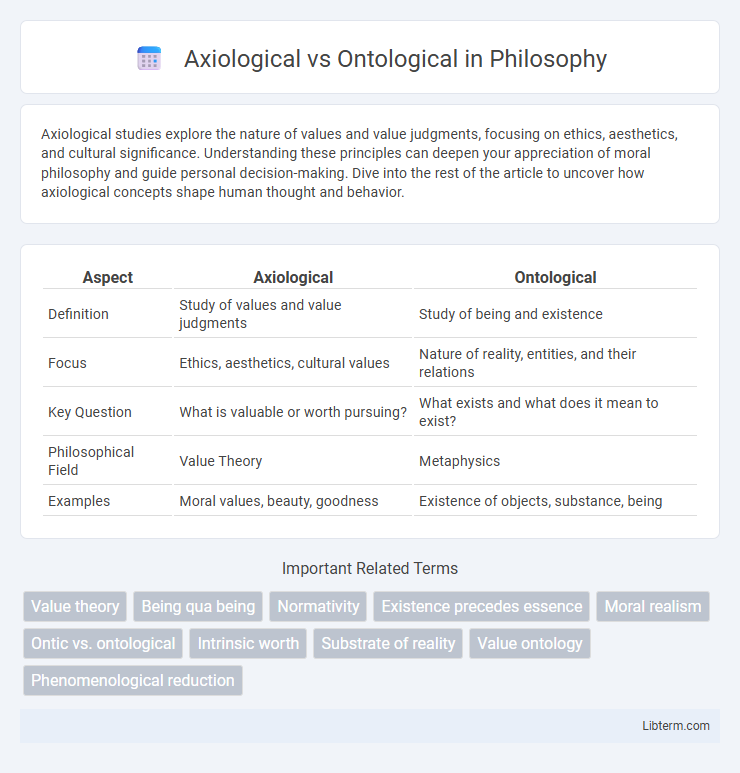Axiological studies explore the nature of values and value judgments, focusing on ethics, aesthetics, and cultural significance. Understanding these principles can deepen your appreciation of moral philosophy and guide personal decision-making. Dive into the rest of the article to uncover how axiological concepts shape human thought and behavior.
Table of Comparison
| Aspect | Axiological | Ontological |
|---|---|---|
| Definition | Study of values and value judgments | Study of being and existence |
| Focus | Ethics, aesthetics, cultural values | Nature of reality, entities, and their relations |
| Key Question | What is valuable or worth pursuing? | What exists and what does it mean to exist? |
| Philosophical Field | Value Theory | Metaphysics |
| Examples | Moral values, beauty, goodness | Existence of objects, substance, being |
Introduction to Axiology and Ontology
Axiology explores the nature of values and value judgments, focusing on ethics and aesthetics to understand what is good, valuable, or worthy. Ontology examines the nature of being and existence, addressing fundamental questions about what entities exist and how they can be categorized. Together, axiology and ontology form core branches of philosophy, analyzing value systems and the essence of reality.
Defining Axiological Perspectives
Axiological perspectives focus on the study of values, including ethics and aesthetics, examining what is valuable or worthy in human life. These perspectives explore how value systems influence decision-making, behavior, and cultural norms. By defining axiological viewpoints, scholars analyze the nature and origin of values to understand their impact on human experience.
Understanding Ontological Foundations
Ontological foundations explore the nature of being and existence, providing a conceptual framework that underpins all entities and their relationships. Axiological perspectives emphasize values and ethics, focusing on what is important or desirable, while ontology seeks to clarify what fundamentally exists regardless of value judgments. Understanding ontological foundations enables a more precise analysis of reality's structure, which is essential for coherent knowledge development and philosophical inquiry.
Key Differences Between Axiology and Ontology
Axiology studies the nature of values and value judgments, focusing on ethics and aesthetics, whereas ontology is concerned with the nature of being and existence. Axiology evaluates what is good, valuable, or desirable, while ontology investigates what entities exist and their essential properties. The key difference lies in axiology's emphasis on value and judgment versus ontology's focus on reality and being.
Historical Context and Philosophical Roots
Axiological concepts, rooted in ancient Greek philosophy, emphasize the study of value, ethics, and aesthetics, tracing back to Plato and Aristotle's exploration of the Good and Virtue. Ontological foundations emerge from metaphysical inquiries focused on the nature of being and existence, notably developed by Parmenides and later refined by Heidegger in the 20th century. Historically, axiological and ontological investigations reflect divergent philosophical priorities, with axiology addressing questions of value and meaning, while ontology tackles the fundamental essence of reality.
Applications of Axiology in Modern Thought
Axiology, the study of values and ethics, plays a crucial role in shaping modern thought across disciplines such as philosophy, psychology, and social sciences by providing frameworks for evaluating moral principles, aesthetics, and cultural norms. In contrast to ontology, which explores the nature of being and existence, axiology offers practical applications in decision-making processes, policy development, and educational methodologies that emphasize value-based judgments. Contemporary applications of axiology influence ethical leadership, human rights discourse, and sustainability practices, highlighting its impact on shaping societal values and guiding human behavior.
Ontological Inquiry in Contemporary Philosophy
Ontological inquiry in contemporary philosophy investigates the nature of being, existence, and reality, addressing questions about what entities fundamentally constitute the world. This inquiry contrasts with axiological concerns by prioritizing the structure and categories of being rather than values or ethics. Key contemporary ontological debates explore the status of abstract objects, the existence of possible worlds, and the implications of metaphysical realism versus anti-realism.
Axiology vs Ontology: Implications for Ethics
Axiology, the study of values and ethics, explores what is morally right and good, shaping ethical principles and judgments. Ontology, the study of being and existence, defines what entities fundamentally exist and their nature, influencing the framework within which ethical concepts are understood. The interplay between axiology and ontology determines how moral values are grounded in reality, impacting the formulation of ethical theories and decision-making processes.
Integrating Axiological and Ontological Approaches
Integrating axiological and ontological approaches enhances philosophical and practical understanding by bridging the study of values with the nature of existence. This synthesis allows for a comprehensive analysis where ethical principles inform the conceptualization of being, fostering more holistic decision-making frameworks. Emphasizing the interplay between value systems and reality structures leads to enriched interpretations in fields such as metaphysics, ethics, and social theory.
Conclusion: Embracing Both Axes of Understanding
Axiological and ontological perspectives offer complementary insights, with axiological focusing on values, ethics, and meaning, while ontological addresses the nature of being and existence. Embracing both axes enhances a holistic understanding by integrating subjective value judgments with objective reality. This synthesis fosters more comprehensive analyses in philosophy, ethics, and interdisciplinary studies.
Axiological Infographic

 libterm.com
libterm.com